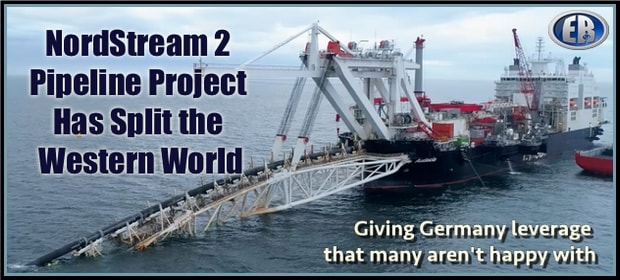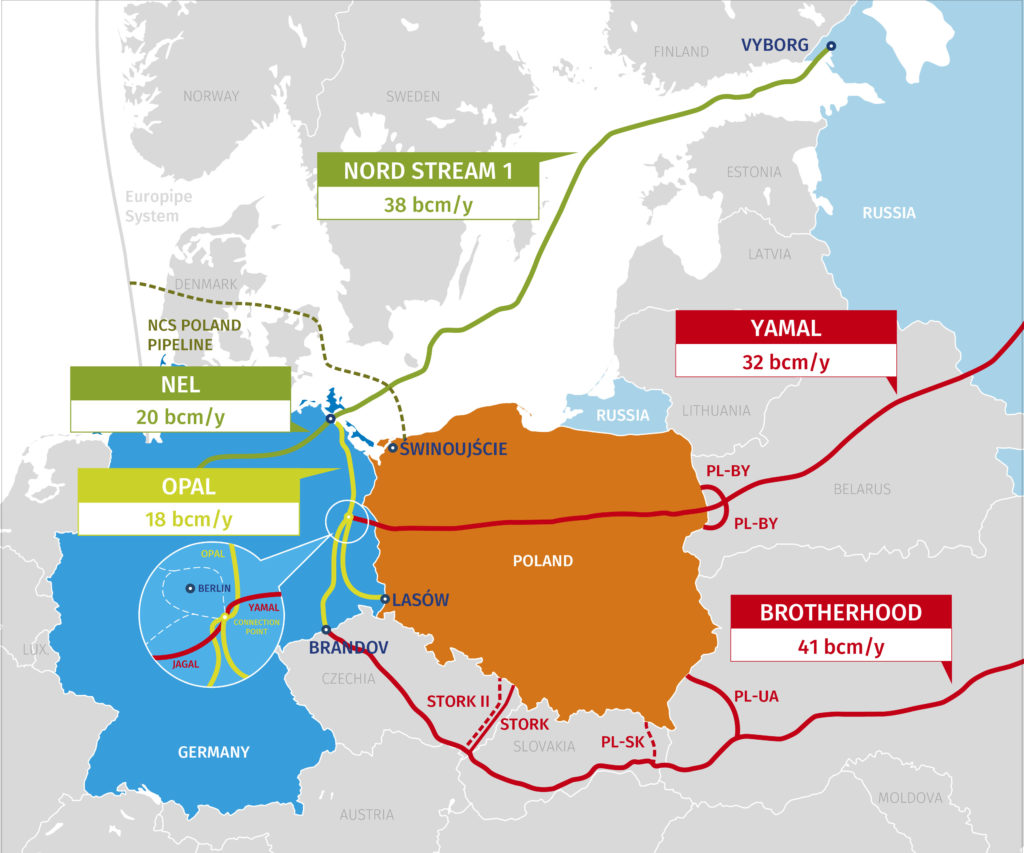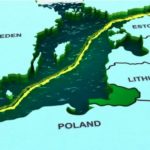
NordStream 2 splits the Western World
GEFIRA
If we were to paint the current situation with a broad brush, we would create the following simplified picture.
The European Union is split into two camps: the old and new member states. The West is split across the Atlantic: it is – roughly – Washington against Paris and Berlin. The world is split into three rivalling superpowers: the United States (strong military and strong economy), Russia (strong military, weak economy) and China (weak military, strong economy). Western Europe gravitates more to Russia than Eastern Europe does; Eastern Europe in turn gravitates more to the United States than Western Europe does.
The state of affairs on the Old Continent is as follows.
[1] Germany wants a stable energy supply in the form of natural gas and from among a number of providers, it has decided on Russia because
[2] Russia has large natural gas deposits and being in need of hard currency is willing to sell its energy resources to any bidder.
[3] The countries of Germany and Russia entered into a commercial agreement which resulted in the construction and completion of one pipeline laid on the bottom of the Baltic: NordStream 1.
[4] Since the capacity of one pipeline was not sufficient to satisfy the needs of Germany and other West European states, another agreement was concluded to build a second pipe along the bottom of the Baltic – NordStream 2 – which is now near completion.
[5] Both pipelines sidetrack eastern European countries – Ukraine, Poland, Czechia and Slovakia – which makes them alarmed because soon, Russia will be able to cut off its gas supplies to and through those countries – the Yamal (Poland, Belarus) and Brotherhood (Czechia, Slovakia, Ukraine) pipelines – while continuing the provision of gas to Western Europe, thus breaking the economic solidarity of the European Union.
[6] The United States helped Western Europe out of trouble during (a) the First World War (against Germany), (b) The Second World War (against Germany) and – (c) the Cold War (against the Soviet Union) and so feels entitled to continue in this role.
[7] The United States perceives itself as the equivalent of the ancient Roman Empire in guarding the Pax Americana (its national and imperial interests) throughout the world but especially Europe; like the Roman Empire, it has its military bases (legions) deployed to many parts of the world, including Europe and, in particular, Germany. Washington feels threatened by Russian economic inroads into Europe.
[8] Western Europe has long striven to emancipate itself from American guardianship, while Eastern Europe (in particular Poland as of now) has been looking to the United States for protection against Russia, the successor to the Soviet Union, because some Eastern European countries have had bitter historical experiences connected with Russia and the Soviet Union: (a) Poland (where anti-Russian sentiment is the strongest) was under Russian rule throughout the 19th century and under Soviet dominance for almost half a century after the Second World War; (b) two Hungarian national uprisings were suppressed respectively by Russia in 1849 and the Soviet Union in 1956; (c) Romania lost to the Soviet Union the whole north-eastern province of Moldova (whose inhabitants are Romanians) in 1940. The United States can therefore rely on Eastern European countries and use them as bridgeheads against Western Europe (Germany in particular) and its dealings with Russia.
[9] The European Union is split over the issue of the two pipelines connecting Russia and Germany. This split resulted in passing Directive 2009/73/EC, which is aimed against Russian commercial dominance as it requires the so called ownership unbundling, which means that (a) energy generation, (b) energy supply and (c) energy transmission must belong to different legal persons. This measure is said to have been designed to (a) guard against Europe’s dependence on one external supplier of energy, (b) counteract monopoly and (c) provide European customers with a choice. The requirement of split ownership of energy generation, supply and transmission is going to make life difficult for Russia or – to be precise – Russia’s Gazprom.
[10] In turn the United States in a glaringly patronising way passed the Protecting Europe’s Energy Security Act, which envisages punitive sanctions against any entity taking part in the construction of NordStream 2. The act is supposed to protect Western Europe – obviously against its will – against Russian dominance and ensure for the United States customers for its natural gas.

Source: BiznesAlert.pl.
The question arises why the United States wants to defend Western Europe and especially Germany against its will? Is it possible that German leaders do not see that the two pipelines pose a threat to the independence of their country?
The answer is many-faceted. It may be that the German leaders prefer Russian rather than American dependence. It may be that they have no choice: the North Sea sources are, for one reason or another, not an option, nor is the gas from the Middle East. It may also be that the German elites are much more interested in their own income than in the condition of their country, still less their nation, to which they feel little commitment. Former Chancellor Gerhard Schröder, for one, was very much involved with the NordStream project.
The German investors may view both NordStream pipelines as sources of stable private and corporate income. To this end, they may be playing a double game: on the one hand encouraging Russians to continue with the construction of the pipeline, while on the other, shedding crocodile tears over Europe’s growing dependence on the eastern gas provider and thus allowing for the European Union to pass the said directive that will also enable them – if they create energy transmission companies that will take over some of the income from Gazprom – to draw larger benefits from the NordStream project.
Some Eastern European countries, while remaining ardent member-states of the Union, are doing their best to disrupt the German-Russian deal, which overlaps with Washington’s plans. This does not mean that we are facing any new exits from the European Union, far from it. The eastern member-states are firmly committed to their participation in it. Rather, the Union is going to be somewhat weakened because it is divided against itself, so to speak. The eastern EU member-states are perhaps oversensitive when it comes to their dependence on Russia. Their leaders tend to think that it is Russia which wants to have control over them. They seem to be overlooking the fact that the NordStream deal has two parts to it: Russia and Germany. If Berlin cared about the sovereignty of the eastern member-states, it would not have entered into the agreement with Moscow. Yes, bypassing Poland, Ukraine, Czechia and Slovakia, Russia can exert economic pressure on these countries by curtailing gas supplies to them without at the same time having to endanger its relations with Germany, the Netherlands or Great Britain. Yet, the two NordStream pipelines are as much an advantage to the Western members of the Union because they function without transit money that would otherwise have to be paid to Belarus, Poland, Ukraine, Slovakia and Czechia, thus making the gas cheaper and because – if the ownership unbundling principle is effected – the West may also have a larger share in the gas supply.
New member states seem to be left to their own devices by their older partners. Washington is their only hope, but Washington is merely acting in defence of its own interests, eyeing suspiciously Berlin and Moscow. Germany has built the present equivalent of the old project of Mitteleuropa – Middle Europe Project – which meant creating a ring of economically dependent states in Central Europe. At present, Berlin, to a larger degree than Moscow, controls the destiny of its eastern and southern, close and farther off neighbours. Germany’s agents of influence operating in Eastern Europe will make every endeavour to eventually bring people to power in Warsaw, Prague, Bratislava, Budapest, Bucharest and Kiev who will take into account German interests. American agents of influence with do the same.
If Berlin prevails, then Germany will strengthen its grip on the European Union; if America prevails, then the EU is going to be weakened.
************
Original article

••••
The Liberty Beacon Project is now expanding at a near exponential rate, and for this we are grateful and excited! But we must also be practical. For 7 years we have not asked for any donations, and have built this project with our own funds as we grew. We are now experiencing ever increasing growing pains due to the large number of websites and projects we represent. So we have just installed donation buttons on our websites and ask that you consider this when you visit them. Nothing is too small. We thank you for all your support and your considerations … (TLB)
••••
Comment Policy: As a privately owned web site, we reserve the right to remove comments that contain spam, advertising, vulgarity, threats of violence, racism, or personal/abusive attacks on other users. This also applies to trolling, the use of more than one alias, or just intentional mischief. Enforcement of this policy is at the discretion of this websites administrators. Repeat offenders may be blocked or permanently banned without prior warning.
••••
Disclaimer: TLB websites contain copyrighted material the use of which has not always been specifically authorized by the copyright owner. We are making such material available to our readers under the provisions of “fair use” in an effort to advance a better understanding of political, health, economic and social issues. The material on this site is distributed without profit to those who have expressed a prior interest in receiving it for research and educational purposes. If you wish to use copyrighted material for purposes other than “fair use” you must request permission from the copyright owner.
••••
Disclaimer: The information and opinions shared are for informational purposes only including, but not limited to, text, graphics, images and other material are not intended as medical advice or instruction. Nothing mentioned is intended to be a substitute for professional medical advice, diagnosis or treatment.





